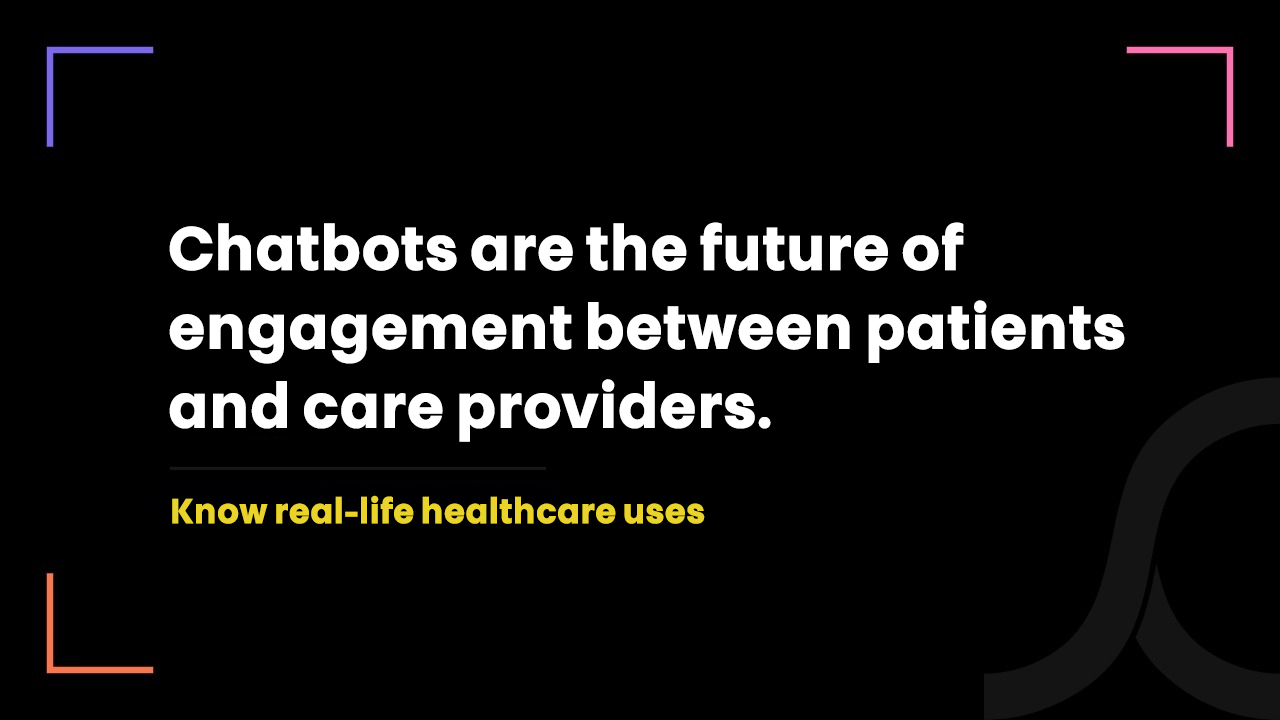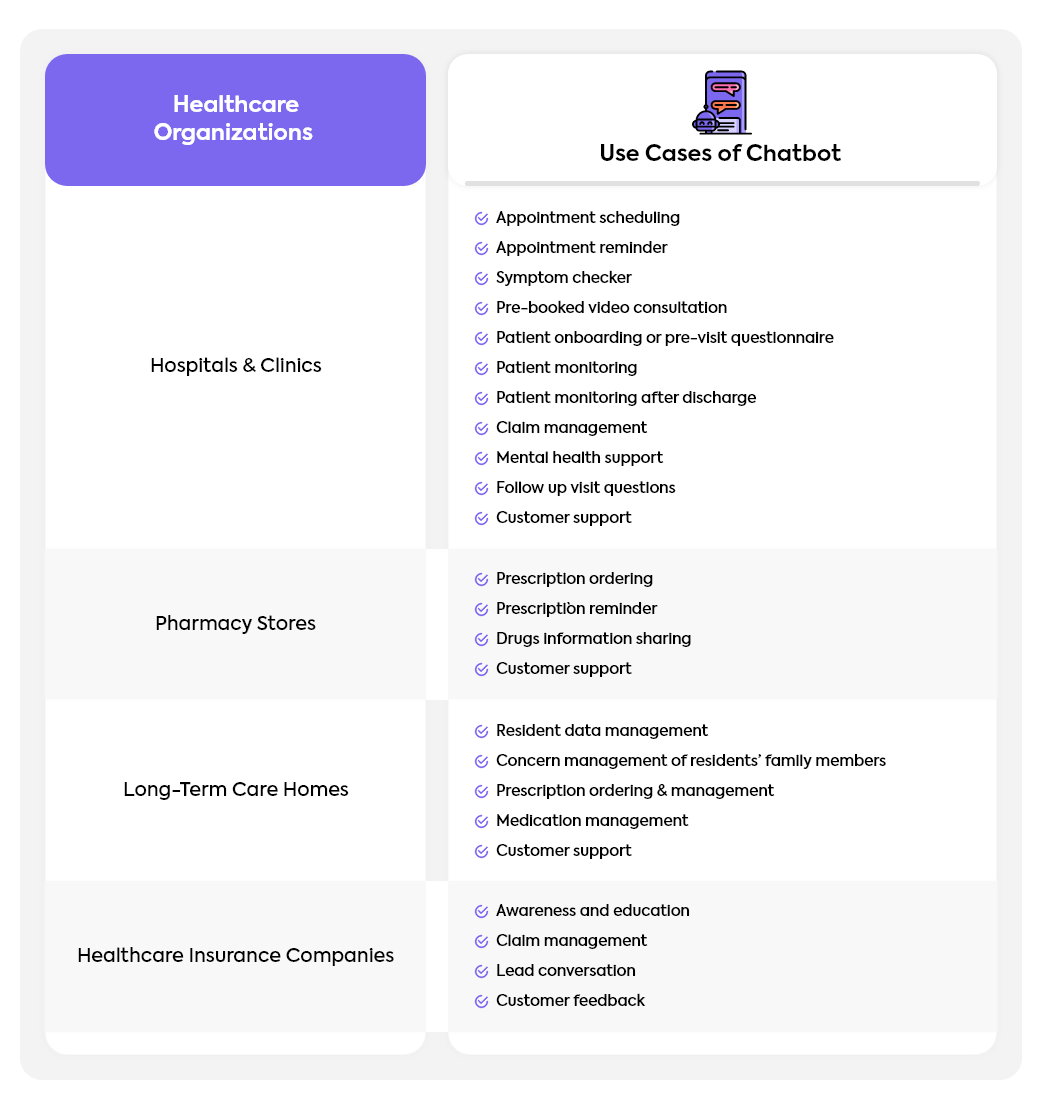Chatbot in Healthcare: Top Chatbot for Healthcare, Use Cases, Security Concerns, Architecture

1 month ago
Let’s talk about two different patient experiences of the same patient.
A patient woke up with a fever and sore throat.
Experience #1:
He called the clinic to book an appointment with a physician.
The recipient checked the physician's availability manually and booked the appointment.
But later the physician told the recipient that he would be not available at that time.
So, the recipient had to rearrange the appointment.
But at that new time, the patient wasn’t available.
The situation became so complex for the patient that he dropped his plan to make a visit to a clinic.
Experience #2:
The patient opened the healthcare chatbot on his mobile phone.
The following is his ‘easy’ conversation with a chatbot for healthcare.
Medical chatbot: “Hi, please select how I can help you.”
The patient selects: “I need to book the appointment.”
Healthcare chatbot: “Select your availability for a physician appointment.”
The patient selects his availability.
Medical chatbot: “Appointment confirmed. Here are the full details.”
In case of a change in appointment date and time, the patient gets automatic SMS and email.
It is possible only because of the healthcare chatbot.
And please note - this is just one example of how useful a chatbot in healthcare is!
What is a Chatbot?
A chatbot is nothing but a computer or mobile software capable of executing text-based conversations with users in real time.
It is a smart program that understands the questions of the users and gives the most suitable answers within seconds.
It uses messaging platforms such as WhatsApp or Facebook Messenger, a website, or a dedicated mobile app to have conversations with the users.
In most cases, a chatbot works on AI and natural language processing technologies to understand and answer the questions of users in no time.
Alexa is the best example of a chatbot.
You ask questions to it and it responds. Or, you give the command and it applies!
The following is another example of a chatbot for healthcare.
Recently, Sapio Analytics's healthcare arm rolled out WhatsApp chatbot to find out the plasma donor in India amid 2nd wave of the pandemic.
Users have to send a Hi message to the provided number along with other details such as state and district names, the blood group required, etc.
The chatbot for healthcare gives back the list of healthcare centers and plasma donors near the user's location.
Healthcare Chatbots Use Cases that Gives Benefit in the True Sense
Any clinical process where you find extensive conversations between your healthcare staff and patients can be optimized with a healthcare chatbot.
For instance, appointment booking, and patient onboarding are common examples of the chatbot in healthcare.
To help you quickly discover the process that can be optimized with a chatbot, we’ve listed the top use cases of healthcare chatbots in different healthcare organizations.

Most Popular Chatbots in the Healthcare Industry You Must Study Before Going for Healthcare Chatbot Development
Chatbots have penetrated almost all industries across the globe.
Many Fortune 500 companies are using chatbots to generate leads and offer remarkable customer support.
Talking specifically about the healthcare industry, increasing optimum internet connectivity and rising adoption of smart devices are causing patients to use chatbots for healthcare rather than tedious human interaction.
According to the report published by Meticulous Research, the healthcare chatbot market is expected to reach $703.2 million by 2025.
And many popular chatbots in healthcare are dominating the million-dollar market.
1. OneRemission
This is the chatbot for healthcare launched by the New York-based company to ease the lives of patients having cancer.
With the OneRemission chatbot for healthcare, patients can know the information they require to fight against cancer.
The chatbot provides patients with a comprehensive list of diets, exercises, and post-cancer practices.
2. Youper
Another chatbot in healthcare is Youper. It is on a very rare mission that no one has ever dared.
It helps users improve their emotional health with easy personalized conversation.
It uses many psychological techniques to eliminate anxiety and stress and help users level up their emotional health.
The more users communicate with the Youper chatbot, the more it knows about the users and personalizes the experience.
3. Babylon Health
This is the best medical chatbot in healthcare.
More specifically, it is a symptom checker.
Based on input provided by the users, it analyzes the symptoms and lets users know what is causing the symptoms.
It also lets users know the treatment or next steps according to the symptoms.
It is powered by AI technology and provides accurate information.
And most importantly, it is a free chatbot.
The best strategic step of Babylone Health we came across is that they have integrated their chatbot with their telemedicine app!
How Does a Chatbot Work? The Architecture
Any chatbot is based on 3 major pillars.
- Artificial Intelligence & Data
- Natural Language Processing
- Knowledge Management
AI helps chatbot to get answers to questions from historic and real-time data.
With more data, it answers more accurately.
Knowledge Management helps chatbots to understand the intent of the users and determine appropriate responses.
Natural Language Processing processes and analyzes large amounts of natural language data and understandably answers users.
Data Security (Compliance) is the Major Challenge for Chatbots in Healthcare
Chatbots in healthcare are very useful.
However, if you don’t address the data security concern, it becomes a curse rather than a boon.
Healthcare is one of the most regulated industries.
In Canada, one federal-level privacy law - PIPEDA and multiple provincial-level data privacy laws apply to medical chatbots.
Because a chatbot for healthcare gets access to multiple private information of the users to give personalized answers, it becomes very urgent to apply some restrictions on it.
You should ensure that the healthcare chatbot gets access to necessary information only and it should not share it with unauthorized users or software.
Otherwise, you will be liable for a hefty fine for putting data privacy at risk.
Thus, it is always advisable to hire a technical partner with expertise in compliance to build a healthcare chatbot.
Where Can You Deploy a Healthcare Chatbot?
The healthcare chatbot provides you with ultimate freedom when it comes to deployment.
You can deploy it on several digital platforms such as,
- WhatsApp and other similar platforms such as Telegram, Slack
- Facebook Messenger (the most popular one)
- Dedicated mobile app (most popular and profitable one)
- On website
Business Advice from Our Business Experts
We have been active in the healthcare IT industry for 7 years and this is what our business experts suggest to everyone planning to build a healthcare chatbot or chatbot for healthcare.
- You can be able to use the chatbot in healthcare at its full potential if you integrate it with smart medical devices for recording health data (temperature, blood pressure, heart rate, etc).
- A healthcare chatbot integrated with a telemedicine app similar to Babylon telemedicine is one of the greatest app features and the best strategy to offer value to the users.
It’s not only the Healthcare Chatbot We Deliver, Our Healthcare Tech and Compliance Expertise!
We’re an Ontario-based team of developers, designers, AI engineers, business experts, and compliance consultants.
We have earned ultimate expertise in healthcare IT solutions due to our focused work in the healthcare industry for the past 7 years.
Our clients always experience that we don’t just deliver healthcare IT solutions.
We deliver our expertise which is rare and useful too.
We engineer the best healthcare chatbot from scratch and always make sure it is compliant with all data privacy laws.
We know what we are doing and thus, we never give you wrong information or updates.
We welcome every query with a free insightful consultation.
And in 2020, all of our clients admitted that the first conversation - which is free - itself solved all of their doubts.
